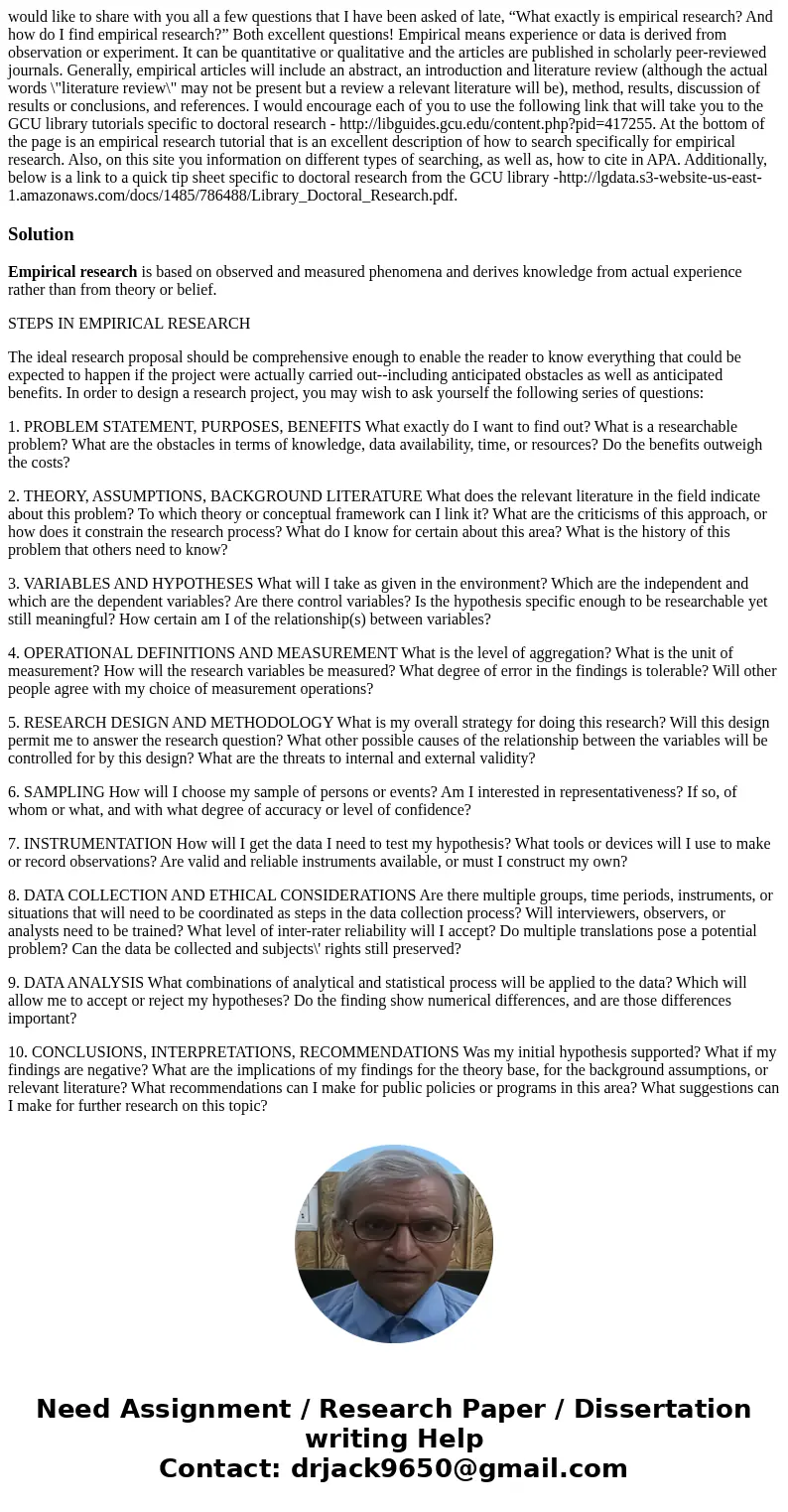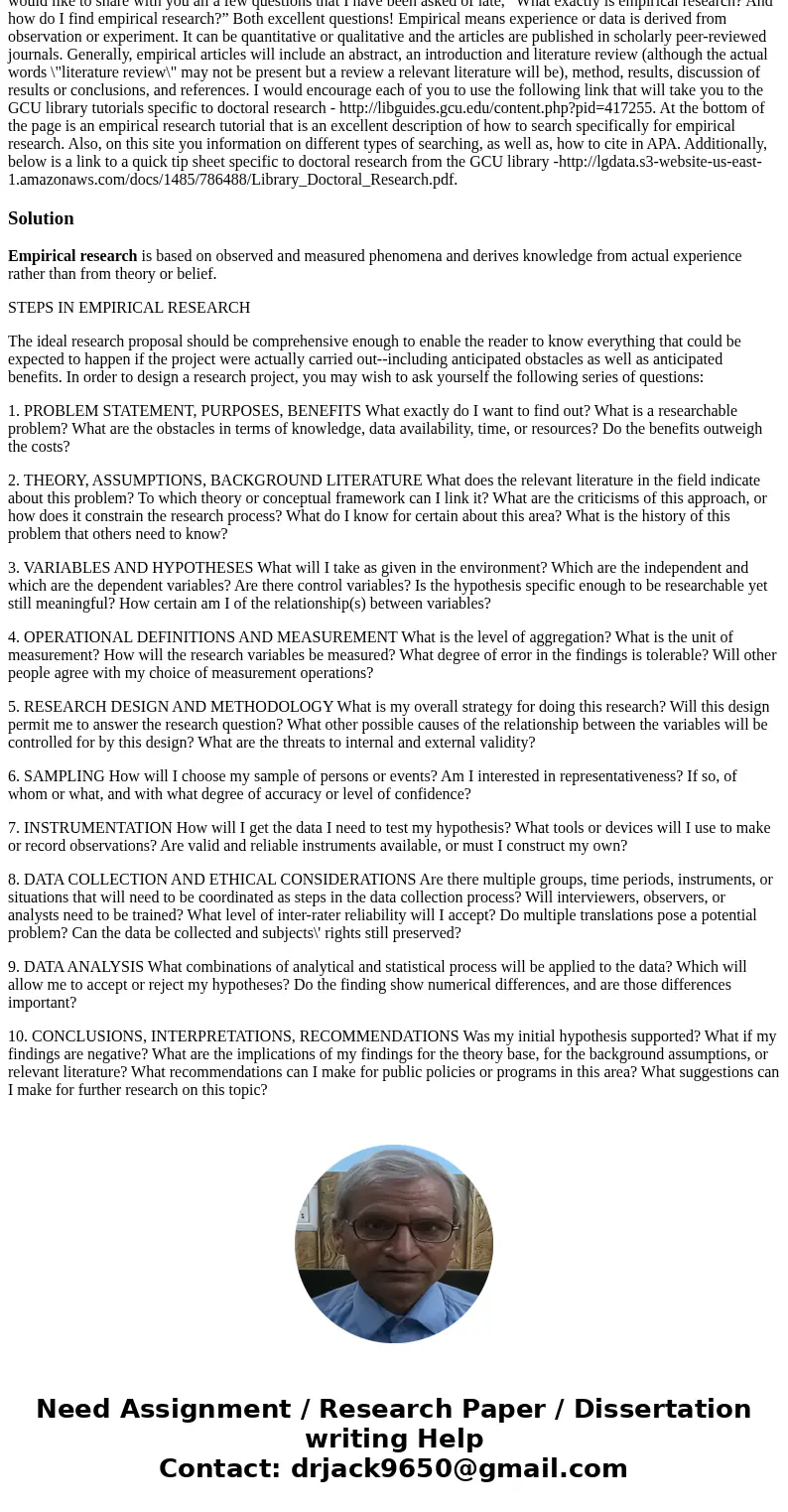would like to share with you all a few questions that I have
would like to share with you all a few questions that I have been asked of late, “What exactly is empirical research? And how do I find empirical research?” Both excellent questions! Empirical means experience or data is derived from observation or experiment. It can be quantitative or qualitative and the articles are published in scholarly peer-reviewed journals. Generally, empirical articles will include an abstract, an introduction and literature review (although the actual words \"literature review\" may not be present but a review a relevant literature will be), method, results, discussion of results or conclusions, and references. I would encourage each of you to use the following link that will take you to the GCU library tutorials specific to doctoral research - http://libguides.gcu.edu/content.php?pid=417255. At the bottom of the page is an empirical research tutorial that is an excellent description of how to search specifically for empirical research. Also, on this site you information on different types of searching, as well as, how to cite in APA. Additionally, below is a link to a quick tip sheet specific to doctoral research from the GCU library -http://lgdata.s3-website-us-east-1.amazonaws.com/docs/1485/786488/Library_Doctoral_Research.pdf.
Solution
Empirical research is based on observed and measured phenomena and derives knowledge from actual experience rather than from theory or belief.
STEPS IN EMPIRICAL RESEARCH
The ideal research proposal should be comprehensive enough to enable the reader to know everything that could be expected to happen if the project were actually carried out--including anticipated obstacles as well as anticipated benefits. In order to design a research project, you may wish to ask yourself the following series of questions:
1. PROBLEM STATEMENT, PURPOSES, BENEFITS What exactly do I want to find out? What is a researchable problem? What are the obstacles in terms of knowledge, data availability, time, or resources? Do the benefits outweigh the costs?
2. THEORY, ASSUMPTIONS, BACKGROUND LITERATURE What does the relevant literature in the field indicate about this problem? To which theory or conceptual framework can I link it? What are the criticisms of this approach, or how does it constrain the research process? What do I know for certain about this area? What is the history of this problem that others need to know?
3. VARIABLES AND HYPOTHESES What will I take as given in the environment? Which are the independent and which are the dependent variables? Are there control variables? Is the hypothesis specific enough to be researchable yet still meaningful? How certain am I of the relationship(s) between variables?
4. OPERATIONAL DEFINITIONS AND MEASUREMENT What is the level of aggregation? What is the unit of measurement? How will the research variables be measured? What degree of error in the findings is tolerable? Will other people agree with my choice of measurement operations?
5. RESEARCH DESIGN AND METHODOLOGY What is my overall strategy for doing this research? Will this design permit me to answer the research question? What other possible causes of the relationship between the variables will be controlled for by this design? What are the threats to internal and external validity?
6. SAMPLING How will I choose my sample of persons or events? Am I interested in representativeness? If so, of whom or what, and with what degree of accuracy or level of confidence?
7. INSTRUMENTATION How will I get the data I need to test my hypothesis? What tools or devices will I use to make or record observations? Are valid and reliable instruments available, or must I construct my own?
8. DATA COLLECTION AND ETHICAL CONSIDERATIONS Are there multiple groups, time periods, instruments, or situations that will need to be coordinated as steps in the data collection process? Will interviewers, observers, or analysts need to be trained? What level of inter-rater reliability will I accept? Do multiple translations pose a potential problem? Can the data be collected and subjects\' rights still preserved?
9. DATA ANALYSIS What combinations of analytical and statistical process will be applied to the data? Which will allow me to accept or reject my hypotheses? Do the finding show numerical differences, and are those differences important?
10. CONCLUSIONS, INTERPRETATIONS, RECOMMENDATIONS Was my initial hypothesis supported? What if my findings are negative? What are the implications of my findings for the theory base, for the background assumptions, or relevant literature? What recommendations can I make for public policies or programs in this area? What suggestions can I make for further research on this topic?


 Homework Sourse
Homework Sourse